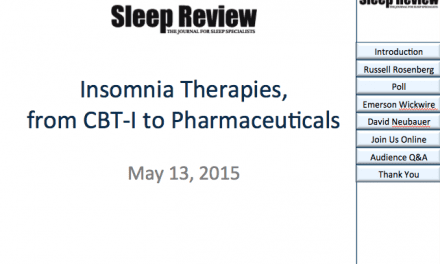A clinical trial has found that HIRREM [high-resolution, relational, resonance based, electroencephalic mirroring] closed-loop neurotechnology is more effective than placebo at reducing symptoms of insomnia and has additional benefits for heart rate and blood pressure regulation. Findings were presented in Boston at SLEEP 2017.
Developed by Brain State Technologies (BST), HIRREM is a noninvasive acoustic stimulation neurotechnology that applies software algorithms for real-time analysis of critical brain frequencies. The algorithms guide production of changing sequences of audible tones, which support brain oscillations to re-organize toward more optimal patterns of symmetry and frequency ratios.
The 3-year study enrolled 107 adults with insomnia and randomly assigned them to receive 10 sessions of either HIRREM or a placebo intervention, which consisted of tones produced by a random generator. Subjects were blinded to their group assignment, and they received equal levels of social interaction during the 2-week treatment period. The trial was conducted at Wake Forest School of Medicine, Department of Neurology (Winston-Salem, North Carolina), by Charles Tegeler, MD.
At the predetermined endpoint 2 months after their sessions, those who received HIRREM reported significantly greater reduction in insomnia symptoms than those who received placebo. Moreover, the HIRREM group showed marked improvements in heart rate variability and baroreflex sensitivity, whereas the placebo group showed no physiological changes. Ninety-four percent of the enrolled subjects completed all sessions and follow-up visits as scheduled, and there were no adverse events in either group.
Lee Gerdes, founder and CEO of BST, says in a release, “We are thrilled that our noninvasive strategy showed highly practical benefits, in an easily tolerable way without side effects, for a problem that affects up to half the US population.” He further notes that Brain State Technologies is continuing innovations on HIRREM and other products for well-being, above and beyond the methodology evaluated in this study.
According to Sung Lee, MD, MSc, director of research at BST, “The brain is the organ of central command. This study shows that HIRREM benefits sleep, and also helps the brain to fine tune its regulation of heart rate and blood pressure in response to changing stress levels.” He says closed-loop neural interventions such as HIRREM have the advantage of precision-guidance based on real-time physiological dynamics, in contrast to reliance on symptom changes or clinical assessments.



